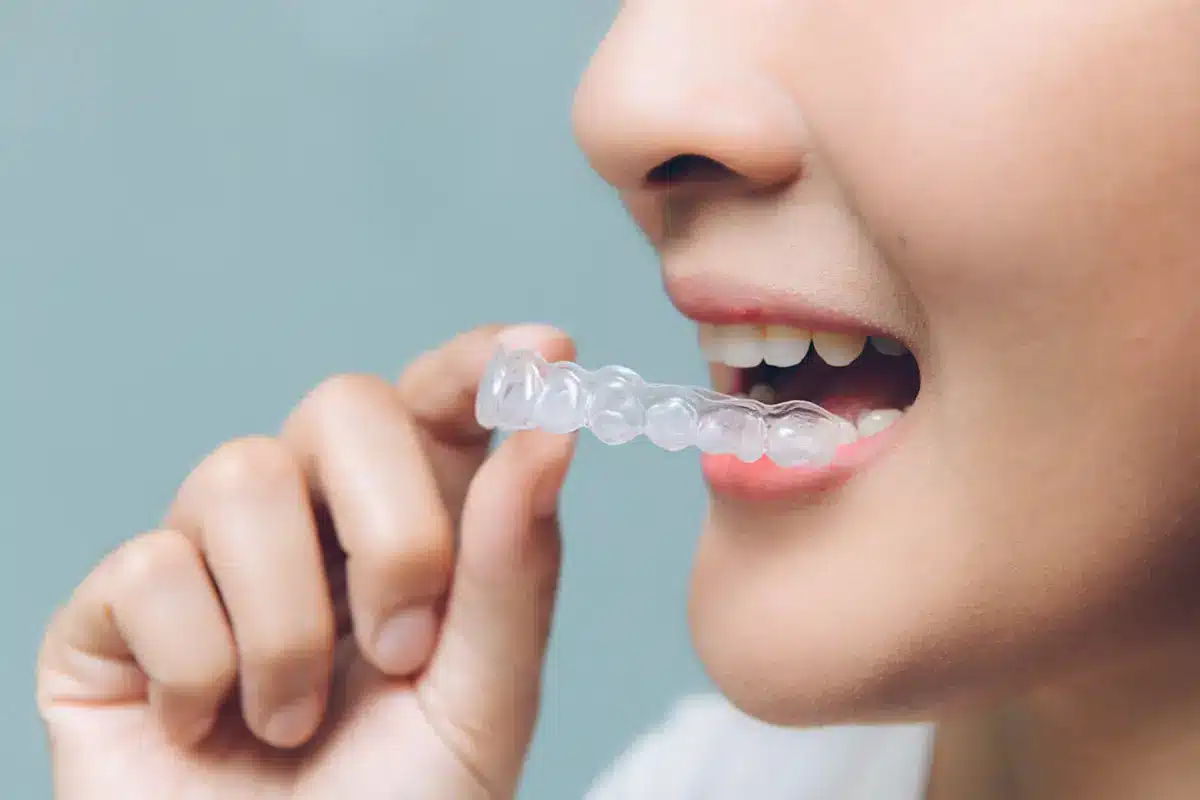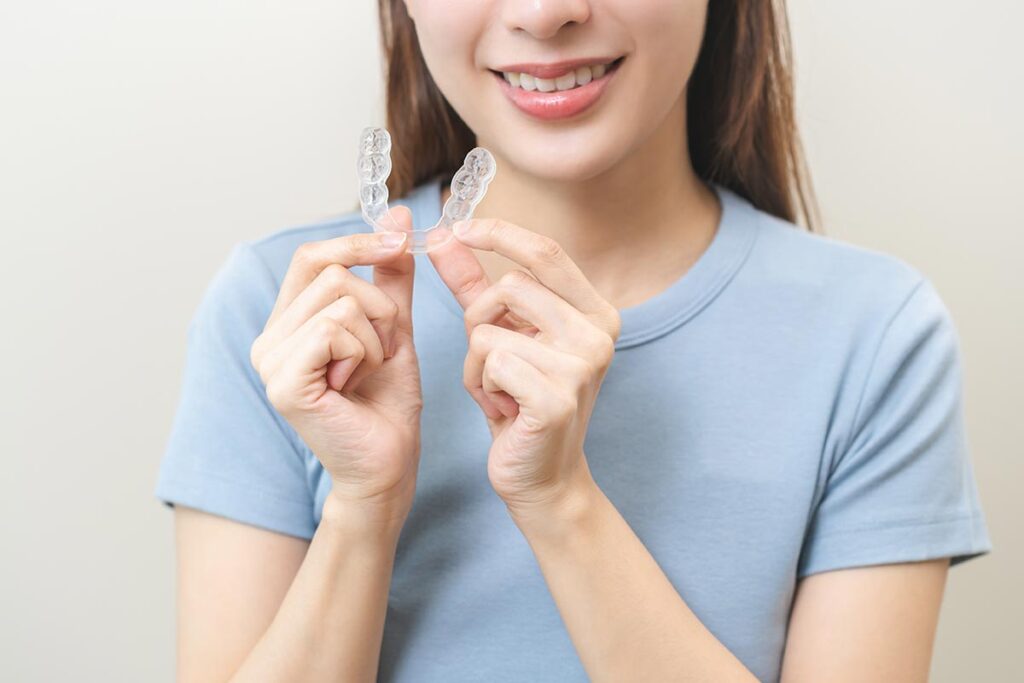
Ever wonder why your mouth suddenly feels dry after starting Invisalign? You’re not imagining it. While these clear aligners are praised for their discreet design and comfort, they can sometimes bring about unexpected side effects—dry mouth being one of the most common.
If your Invisalign trays are making your mouth feel sticky or parched, don’t worry—you’re not alone, and it’s usually manageable. Here, we’ll cover why this happens, how to relieve it, and what to do if it persists.
Does Invisalign Cause Dry Mouth?
Yes, Invisalign can potentially cause dry mouth in some people. This happens because the aligners partially cover the teeth and gums, which can interfere with normal saliva flow. Saliva plays a crucial role in keeping the mouth moist, controlling bacteria, and aiding in digestion. When saliva production drops, it can lead to a dry, uncomfortable feeling that may also include thick saliva, bad breath, and a dry throat. While this side effect is typically temporary, it’s important to manage it effectively to avoid further oral health issues.
Does Invisalign Dry Mouth Go Away on Its Own?
In many cases, yes—Invisalign-related dry mouth tends to improve over time as your body adjusts to wearing the aligners. Initially, your mouth may interpret the aligners as a foreign object, disrupting natural saliva flow. But as you adapt to having them in place for most of the day, saliva production often stabilizes and symptoms fade.
That said, if dry mouth persists beyond the first few weeks or becomes particularly uncomfortable, it shouldn’t be ignored. Ongoing dryness can increase your risk of cavities, gum disease, and bad breath. In those cases, proactive steps—like staying hydrated and maintaining good oral hygiene—can help speed up relief and prevent complications.

Tips for Preventing Invisalign Dry Mouth and Bad Breath
Dealing with dry mouth and bad breath while wearing Invisalign braces can be frustrating, but the good news is that there are several ways to minimize or even prevent these side effects. With a few intentional habits and adjustments, you can keep your mouth feeling fresh and comfortable throughout your treatment.
Here are some practical tips to help you stay ahead of dryness and maintain optimal oral hygiene.
Mouthwashes, Mints, or Sprays
One of the simplest ways to combat dry mouth is by using alcohol-free mouthwash, which can freshen your breath without further drying out your mouth. Additionally, sugar-free mints or mouth sprays can stimulate saliva production and keep your mouth feeling moist throughout the day. These options are easy to carry and use on the go, making them convenient solutions for Invisalign users experiencing dryness or bad breath between meals and cleanings.
Avoid Tobacco and Caffeine
Tobacco products and caffeinated drinks like coffee, tea, and soda can worsen dry mouth symptoms. Both substances reduce saliva production and contribute to dehydration, which compounds the dryness already caused by your aligners. Avoiding or limiting these can help your mouth stay moist and your breath fresher. Cutting back may also improve your overall oral health, making your Invisalign experience more comfortable and effective.
Drink Plenty of Water Every Day
Staying hydrated is one of the most effective ways to combat Invisalign-related dry mouth. Drinking water throughout the day helps keep the mouth moist, supports healthy saliva flow, and flushes away food particles and bacteria that can cause bad breath. Aim to sip water regularly—especially if you’re talking a lot or spending time in air-conditioned environments, which can be drying. Keeping a water bottle nearby is a simple habit that can make a big difference.
Washing your aligners consistently
Clean aligners are key to reducing bacteria buildup, which can contribute to both dry mouth and bad breath. Make it a habit to rinse and brush your aligners gently with a soft toothbrush and clear, unscented soap each time you remove them. Avoid using toothpaste, which can scratch the surface and trap odor-causing bacteria. Keeping your aligners fresh not only supports oral health but also enhances comfort throughout your Invisalign treatment.
Breathe Through Your Nose
Mouth breathing is a common but often overlooked contributor to dry mouth. When you breathe through your mouth—especially while sleeping—it reduces saliva flow and allows moisture to evaporate more quickly. By training yourself to breathe through your nose, you help preserve natural hydration and reduce the chances of developing dry mouth symptoms during Invisalign treatment. If nasal congestion or allergies are making nose breathing difficult, consider speaking with your doctor to address the root cause.
Consider Getting a Humidifier
Using a humidifier—especially while you sleep—can help combat dry mouth by adding moisture to the air you breathe. This is particularly helpful for people who live in dry climates or sleep in air-conditioned rooms, where the air tends to dry out the mouth and throat. A humidifier can support a more comfortable breathing environment and reduce symptoms related to mouth breathing, keeping your mouth from drying out overnight while wearing your aligners.
Dental Hygiene: Brush your teeth (and tongue)
Maintaining strong oral hygiene habits is essential for reducing dry mouth and preventing bad breath while using Invisalign. Brushing your teeth at least twice a day—and your tongue too—helps eliminate bacteria and food debris that can thrive in a dry environment. Use a fluoride toothpaste, and don’t forget to floss daily. These small steps go a long way in protecting your dental health and ensuring your mouth stays clean, fresh, and healthy throughout treatment.

Are There Other Invisalign Side Effects I Should Know About?
Dry mouth isn’t the only adjustment your mouth may face during Invisalign treatment. Because aligners impact how your teeth, gums, and jaw interact, it’s natural to notice other changes as well. Fortunately, most of these side effects are temporary and easy to manage with the right care and expectations.
Let’s take a look at a few other common Invisalign side effects you might encounter on your way to a straighter smile.
Discomfort and Soreness
It’s completely normal to experience some discomfort or soreness when you begin Invisalign or switch to a new set of aligners. This sensation is typically a sign that your teeth are moving as intended. Most Invisalign patients describe the feeling as a dull pressure rather than a sharp pain, and it usually fades within a few days. If the soreness becomes intense or lingers longer than expected, consult your provider to ensure your aligners are fitting correctly.
Speech Changes
Some Invisalign users may notice slight changes in their speech, particularly during the first few days of wearing new aligners. This is typically due to the aligners covering part of the palate or altering tongue placement. You might experience a mild lisp or struggle to pronounce certain words clearly at first. Thankfully, this effect is usually temporary—most Invisalign users adapt quickly and speak normally again within a few days as their mouth adjusts.
Increased Saliva Production
Though it might seem contradictory, some patients experience increased saliva production during the early stages of Invisalign treatment. This happens because your mouth interprets the new aligners as a foreign object, triggering a response from your salivary glands. The result is often temporary and tends to normalize as your body adjusts. While it’s usually harmless, excessive saliva can be inconvenient or mildly uncomfortable until your mouth becomes accustomed to the aligners.
Allergic Reactions
Though rare, allergic reactions to Invisalign aligners can occur. These reactions may be triggered by the plastic material in the aligners and could cause symptoms such as gum irritation, itchiness, or a burning sensation in the mouth. If you notice unusual discomfort that doesn’t go away after a few days of wear or experience swelling or rashes, it’s important to consult your dental provider. They can assess whether you’re having an allergic response and recommend an alternative solution to keep your treatment safe and effective.
Get Your Treatment from an Expert Dentist or Orthodontist
Choosing a skilled and experienced dental provider can make all the difference when it comes to managing side effects like dry mouth during Invisalign treatment. The right specialist will ensure your aligners fit properly, your oral health stays on track, and any discomfort is addressed quickly and effectively.
At Gallardo Periodontics and Implant Dentistry, Dr. John Paul Gallardo brings over 25 years of advanced expertise in treating complex dental needs, including Invisalign care. Recognized for his meticulous technique and commitment to patient comfort, Dr. Gallardo offers tailored solutions that prioritize both function and aesthetics. To get started on a smooth Invisalign journey, call us at 305-447-1447 or visit our contact page to schedule a consultation.